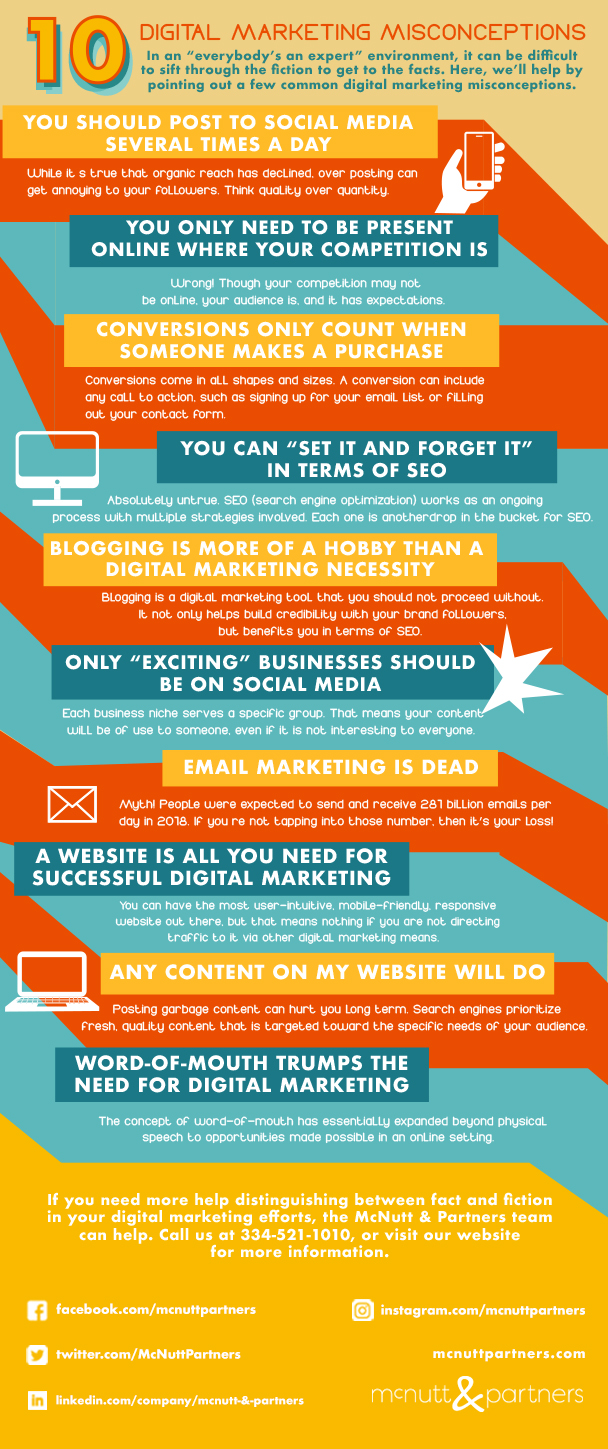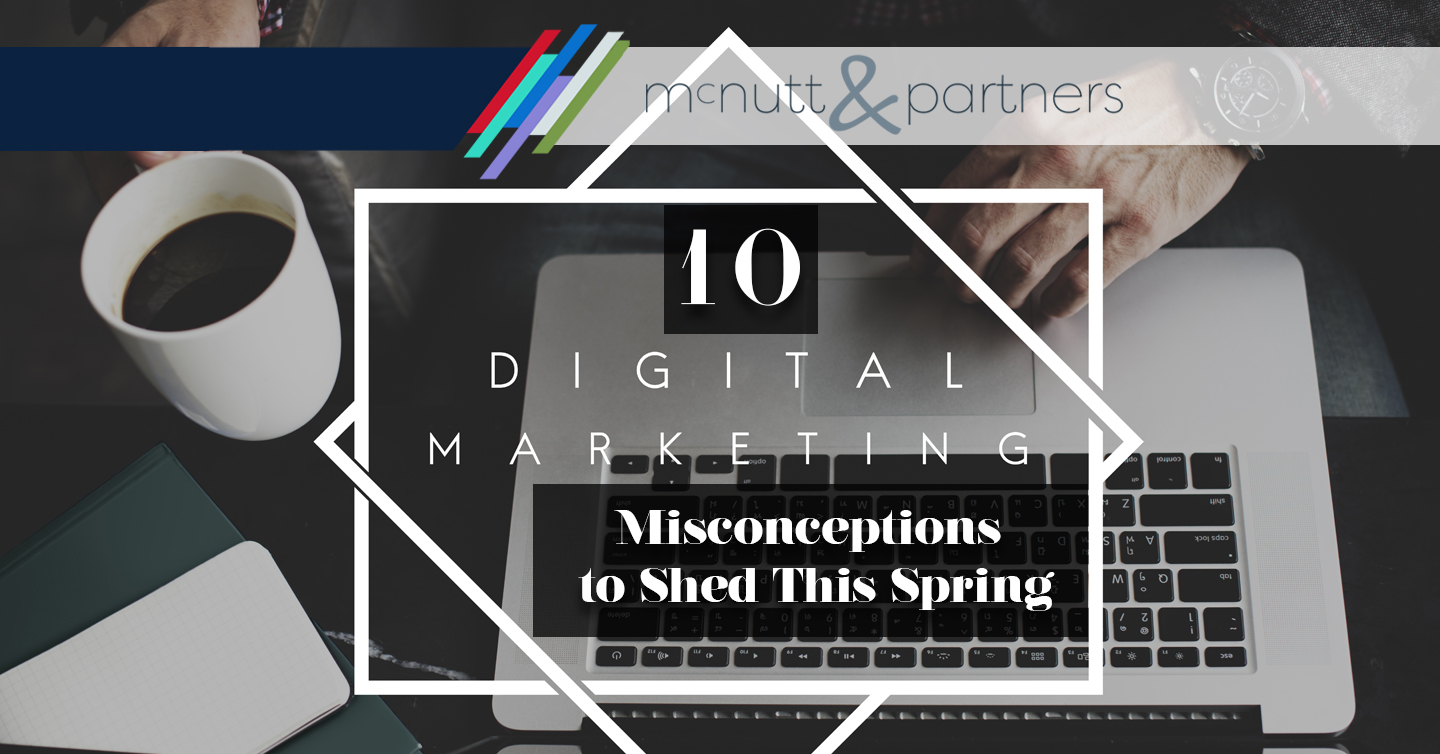Whether it is cultivating a social media presence or simply checking the weather in the mornings, almost everyone alive today is online in some form or fashion—and with everyone being on the internet, everyone has an opinion. If you are working to build a brand presence online, you’ve probably been given advice (solicited or not) from friends, family, colleagues and neighbors. But whose advice is right? In an “everybody’s an expert” environment, it can be difficult to sift through the fiction to get to the facts. Here, we’ll help by pointing out a few common digital marketing misconceptions.

- You should post to social media several times a day. While posting to social media multiple times a day might be right for some brands, it can have the opposite effect for others. It’s true that organic reach has declined on social media for business pages, but that does not mean you should oversaturate your accounts with multiple posts per day. This can get annoying to your followers, and the last thing you want is for them to unfollow you in an already-limited organic reach climate. Start out with caution when it comes to your posting schedule. Monitor feedback, and increase your posting frequency gradually if people are engaging with your posts. You should be more focused on follower engagement on social media than the number of posts you put out there. Think quality over quantity.
- You only need to be present online where your competition is. “The guy across the street isn’t online, so why should I be?” Wrong! If your competition isn’t online, that’s exactly why you SHOULD be. Being present online is no longer optional. Though your competition may not be online, your audience is, and it has expectations.
- Conversions only count when someone makes a purchase. Digital marketers want conversions, which refers to the point at which a potential lead becomes an actual customer. However, among the digital marketing misconceptions out there is the idea that you only count conversions when they lead to a sale. False. Conversions come in all shapes and sizes. A conversion can include any call to action, whether it is someone signing up for your email list, filling out your contact form or even downloading resources you have posted on your website. The truth is, each of these could potentially lead to revenue, which means they should not go ignored.
- You can “set it and forget it” in terms of SEO. Absolutely untrue. SEO (search engine optimization) works as an ongoing process. It involves strategies like keywords, backlinks, website speed and security, mobile friendliness—the list goes on. Each one is another drop in the bucket for SEO. As you continue to create and disseminate digital content and assets, you should continue to optimize that content for search rankings.
- Blogging is more of a hobby than a digital marketing necessity. Anyone can go online and start a blog. From clean eating to collecting stamps, there’s a blog out there for anything and everything. When it comes to digital marketing, however, blogging is a tool that you should not proceed without. The benefits of blogging from a marketing standpoint are twofold. For one, it shows brand followers that you know your stuff—and that you care enough to share your industry knowledge with them. On the other hand, maintaining a blog is also beneficial for SEO. It gives you a space to incorporate keywords, backlinks and just general fresh content—all of which make your site look good in the eyes of a search engine.
- Only “exciting” businesses should be on social media. The great thing about the internet is, it’s all-inclusive. You may think that plumbing, pest control or paper products are too “boring” to sustain social media accounts, but you’d be wrong (and we’ve run accounts for businesses in these industries to prove it). Each business niche serves a specific group, whether your brand is B2B (business-to-business) or B2C (business-to-consumer). That means your content will be of use to someone, even if it is not interesting to everyone.
- Email marketing is dead. With so many digital marketing routes to take, you may wonder whether email is becoming obsolete. The short answer—it’s not. Email is still a very viable tool for reaching a targeted consumer base. According to a report from The Radicati Group, people were expected to send and receive 281 billion emails per day in 2018, which was higher than in 2017. In the United States, more than 85 percent of adults send or read email, according to the same study, and 99 percent of those people check their email every day. If you’re not tapping into those numbers in your marketing efforts, then it’s your loss!
- A website is all you need for successful digital marketing. Website traffic is the ultimate goal for many brands, but that does not mean that a website is the only asset you need in your digital toolbox. You can have the most user-intuitive, mobile-friendly, responsive website out there, but that means nothing if you are not directing traffic to it. The way you do that is via other marketing means, like social media, email, paid online ads and even traditional marketing platforms.
- Any content on my website will do. Think you can throw up some pictures, copy-and-paste some text onto your site and call it a day? Think again! Among our digital marketing misconceptions is the idea that it doesn’t matter what content you put out there, as long as you are putting something into cyberspace. The truth is, posting garbage content to your website and other digital assets could actually be hurting you in the long run. Search engines prioritize fresh, quality content that is targeted toward the specific needs of your audience. In addition to search engines, your brand followers will also appreciate content that is beneficial to them—and
- that is updated on a regular basis.
- Word-of-mouth trumps the need for digital marketing. Consumers rely heavily on word-of-mouth referrals, and that’s something that will likely always be the case. However, word-of-mouth can also happen online, with your digital marketing efforts facilitating. For example, word-of-mouth could be asking customers to leave an online review, a branded hashtag or even a photo of their experience in a retail space. The concept of word-of-mouth has essentially expanded beyond physical speech to opportunities made possible in an online setting.
Don’t get caught up in digital marketing misconceptions. If you need more help distinguishing between fact and fiction in your digital marketing efforts, the McNutt & Partners team can help. Call us at 334-521-1010, or fill out our contact form for more information.

